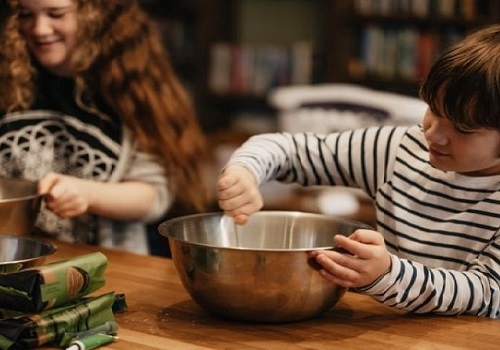5 reasons to bring kids into the kitchen

Follow us Now on Telegram ! Get daily 10 - 12 important updates on Business, Finance and Investment. Join our Telegram Channel
The kitchen is a simple and casual place, but it can become the hub for developing and enhancing you're kid's skills, be it motor, sensory, or even curiosity. Simple scientific experiments play a vital role in kids' development as they grow up. Purvi Gandhi, Occupation Therapist, Intervention Coach and Founder of Theraphil, breaks down each skill a child can gain while helping out in the kitchen:
* Motor skills: This includes gross as well as fine motor skills. When you stir with wooden spoons, pour, squeeze, knead a dough, open different size and shaped bottles (grasp development), hold the spoon, and scoop out the ingredients. Working in the kitchen supports the development and strengthening of our finger muscles too. It is important to develop these muscles since it helps us write, and do everyday chores like shoe lace tying, buttoning, zipping, etc.
* Enhancing bilateral coordination: This is the skill that allows you to use both sides of your body at the same time for example, stabilising the paper with one hand while writing with the other or cutting with scissors. Activities like using a rolling pin with both hands, shilling peas, cutting simple salad for sandwiches, and sifting flour can enhance bilateral coordination in a fun way.
* To develop curiosity with safe scientific experiments which also requires motor skills as well as gives sensory stimulation like growing sprouts, making edible slime( great for tactile stimulation and developing muscles of the hand by adjusting the required consistency) with Fruitella which is available in Indian market or gummy bears available globally, lemonade fizz ( pouring water into glass with one hand and holding glass with other hands- bilateral integration, squeezing lemon (hand muscles) and a visual delight of the fizz.
* Sensory experiences: Cooking offers so many opportunities to explore sensory inputs. Like smelling different aromas, in fact, it can be made into a game to smell different cooking ingredients like coffee, tea, cardamom, and cinnamon by using only smell and not vision. It also provides other sensory inputs like feeling different textures with our skin on our hands as well as our mouths like the sticky texture of the dough or of a caramelised chocolate in the mouth, the rough texture of the salt, pepper, and the list is endless. Also receiving heavy work input (proprioception) by performing various activities like kneading the dough, stirring, and mixing foods with a thick consistency.
* Planning and organisation: Assembling the ingredients and planning the steps before starting to cook helps in enhancing planning and organisational skills. These skills are very useful when the child needs to organise his school bag, and desk at school.
It takes a lot of planning to balance school work and play to avoid disappointments. Last but not least it can be made more fun by making it a family cooking day together which can help in making stronger relationships and creating connections.












 320-x-100_uti_gold.jpg" alt="Advertisement">
320-x-100_uti_gold.jpg" alt="Advertisement">












